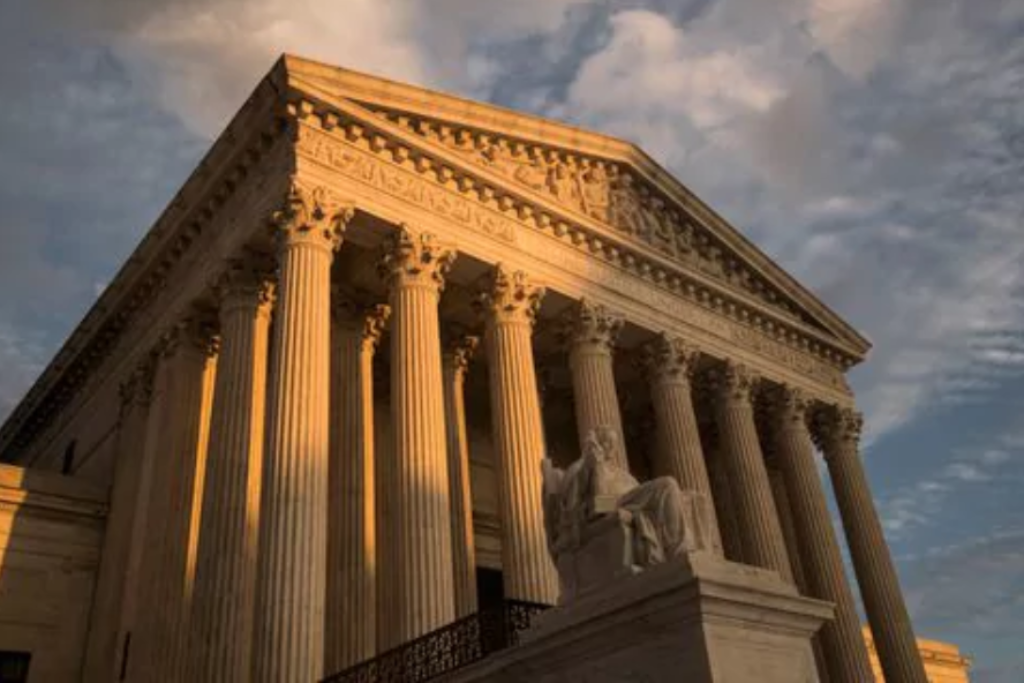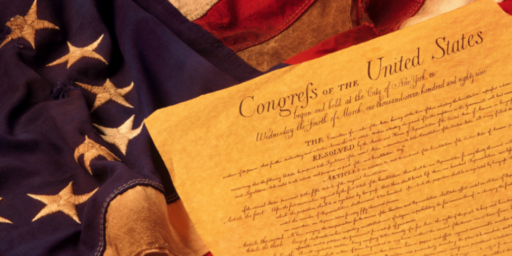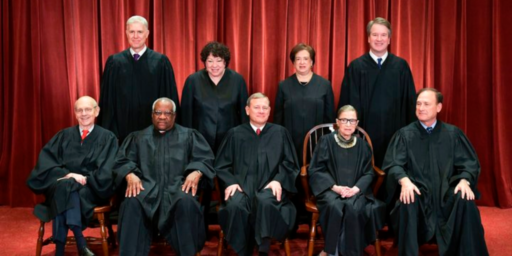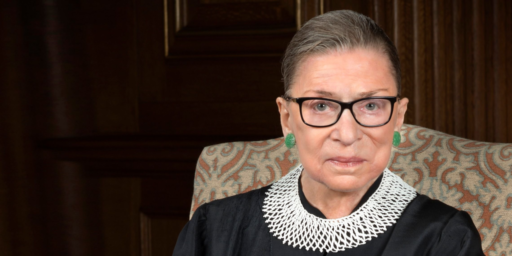Supreme Court Upholds ‘Dual Sovereigns’ Exception To Double Jeopardy Clause
The Supreme Court has ruled to keep the long-standing "dual sovereigns" exception to the Double Jeopardy Clause in place.

The Supreme Court has ruled to uphold a long-standing exception to the Constitution’s Double Jeopardy Clause that allows the Federal or state government to charge a defendant for the same offense based on their respective laws, turning down the opportunity to overrule an exception that has come under increasing criticism in recent years:
WASHINGTON — In a decision that could affect associates of President Trump accused of wrongdoing and hoping for pardons, the Supreme Court ruled on Monday that criminal defendants may be prosecuted for the same offenses in both federal and state court. Since Mr. Trump’s pardon power extends only to federal crimes, the ruling leaves people he pardons subject to state prosecutions.
The vote was 7 to 2, with Justices Ruth Bader Ginsburg and Neil M. Gorsuch each filing dissents.
Writing for the majority, Justice Samuel A. Alito Jr. said there was no good reason to overrule 170 years of precedents allowing separate prosecutions.
The Constitution’s double jeopardy clause generally forbids subsequent prosecutions. But the Supreme Court has made one exception. Saying that the federal government and the states are independent sovereigns, the court has allowed separate prosecutions of the same conduct in state and federal courts.
The case before the court concerned an Alabama man, Terance Gamble, who was prosecuted by state authorities for possessing a gun after having been convicted of a felony. He was convicted and sentenced to a year in prison.
As the state case moved forward, federal prosecutors charged Mr. Gamble with the same conduct. This time, he was sentenced to 46 months, with the two prison terms to run concurrently.
Mr. Gamble argued that this violated the double jeopardy clause, but lower courts said the dual prosecutions were permissible under Supreme Court precedents.
Justice Alito wrote that Mr. Gamble had failed to make the case for overruling those precedents. “The historical evidence assembled by Gamble is feeble,” he wrote. “Pointing the other way are the clause’s text, other historical evidence and 170 years of precedent.”
Justice Alito wrote that states are separate sovereigns much as foreign nations are. “If, as Gamble suggests, only one sovereign may prosecute for a single act, no American court — state or federal — could prosecute conduct already tried in a foreign court,” he wrote.
“Imagine, for example,” Justice Alito wrote, “that a U.S. national has been murdered in another country.” Both nations, he wrote, would have an interest in prosecuting the murderer.
“The murder of a U.S. national is an offense to the United States as much as it is to the country where the murder occurred and to which the victim is a stranger,” he wrote. “That is why the killing of an American abroad is a federal offense that can be prosecuted in our courts, and why customary international law allows this exercise of jurisdiction.”
Much of Justice Alito’s majority opinion was a detailed account of old English decisions, treatises and founding-era materials. He said Mr. Gamble had failed to make a compelling case based on those documents for overruling the court’s longstanding interpretation of the Fifth Amendment’s double jeopardy clause.
“The English cases are a muddle,” Justice Alito wrote. “Treatises offer spotty support. And early state and federal cases are by turns equivocal and downright harmful to Gamble’s position. All told, this evidence does not establish that those who ratified the Fifth Amendment took it to bar successive prosecutions under different sovereigns’ laws — much less do so with enough force to break a chain of precedent linking dozens of cases over 170 years.”
(…)
[T]he issue did not divide the justices across the usual ideological lines. But Justice Thomas reversed course in a 17-page concurring opinion on Monday, writing that “the historical record does not bear out my initial skepticism of the dual-sovereignty doctrine.”
Justice Thomas’s opinion was also notable for its extended critique of the court’s general approach to how much respect to give precedents. He said the court should not hesitate to overrule “demonstrably erroneous precedents.”
In dissent, Justice Ginsburg said the court should have overturned the double jeopardy decisions at issue in Mr. Gamble’s case, saying they had “been subject to relentless criticism by members of the bench, bar and academy.”
She was also critical of the majority’s historical approach to the question.
“This case,” she wrote, “does not call for an inquiry into whether and when an 18th-century English court would have credited a foreign court’s judgment in a criminal case. Gamble was convicted in both
Alabama and the United States, jurisdictions that are not foreign to each other. English court decisions regarding the respect due to a foreign nation’s judgment are therefore inapposite.”
Notwithstanding the controversy that has surrounded it in recent years, the “separate sovereigns” doctrine has its roots in case law that goes back nearly a century. This rule was established by the Supreme Court in a 1959 case called Abbate v. United States 359 U.S. 187 (1959), although it was actually first stated by the Court 37 years earlier in a case called United States v. Lanza 260 U.S. 377 (1922).
In Lanza, a case which arose during the Prohibition era, a Defendant was prosecuted and convicted of making, transporting, and selling intoxicating liquors in violation of Washington state law. He was subsequently charged in Federal Court with violating the National Prohibition Act under the same set of facts. The Supreme Court ruled in that case that this subsequent Federal prosecution did not violate the Double Jeopardy clause essentially because the states and the Federal Government are separate entities and that prosecution by one does not rule out prosecution based on the same set of facts by the second.
In Abbate, the Defendant was “part of [a] conspiracy to blow up multiple facilities owned by the Southern Bell Telephone Company. He was convicted in Illinois under a state law making it a crime to conspire to destroy the property of another and sentenced to three months of imprisonment. Thereafter, Abbate was indicted in [a] federal district court for a violation of federal law stemming from the same conspiracy.” (Source) Abbate’s attorney asked the Court to reconsider the ruling in Lanza that had established the dual sovereign doctrine, but the Court declined to do so.
Prior to today’s ruling, there had been at least some indication that the Court might be willing to reconsider its rulings in Lanza and Abbate. Indeed, the fact that they accepted this case for review at all was seen by many as a signal that there could be as many as four Justices who were at least willing to consider modifying or even overruling the two cases and limiting the ability of state and Federal prosecutors to re-charge Defendants who have been acquitted (or convicted) in a different jurisdiction. At oral argument, though, it became rather apparent that a majority of Justices were more sympathetic to the argument that the doctrine of stare decisis should control here and the precedents should be allowed to stand. Hence, we have today’s opinion in which most of the Court’s conservative majority, and three of the members of the liberal wing of the Court, vote to let this exception stand. It just goes to show you that presumptions of how a Justice might decide a case based on ideology are not always valid.
At its heart, the majority opinion is rooted in the fact that the “separate sovereigns” doctrine has been in place for nearly a century now thanks to the rulings in Lanza and Abbate. Over that period of time, both the Federal Government and the states have enacted an entire system of laws that essentially depends on the presumption that individuals can be charged under both Federal and state law for criminal violations arising out of the same series of events. Additionally, the doctrine itself is well-rooted in the Tenth Amendment, Federalism, and the idea that there is a difference between the Federal and state governments.
The Court also goes back to the roots of the Constitution and the Double Jeopardy rule, which can be found in the British Common law that serves as a basis for so much of American law and, more importantly, informed the drafters of the Constitution and Bill of Rights as they wrote the nation’s founding documents. This history, the court found, supports the idea that the rule was not meant to apply to situations where existing law makes it possible to charge a Defendant on the same basic facts using the same facts. Justice Alito also makes note of the fact that current Federal law makes it a Federal crime to kill an American citizen overseas, noting that this statute makes it possible for someone to be charged both in the United States and in the country where the crime took place. This is another example of the “dual sovereigns” situation and argues strongly for the position that the situation should be the same when someone is charged under both Federal and state law since, legally, the individual states are considered to be sovereign entities united under the Federal Constitution.
As noted, the two dissenters in the case were Justices Ginsburg and Gorsuch. Justice Thomas, who had also publicly questioned the doctrine, ended up filing a Concurring Opinion agreeing with the judgement but disagreeing with the Majority Opinion on the amount of deference to be given to prior opinions under the doctrine of stare decisis. As far as the result of the case, though, Thomas ended up being in full agreement with the majority, making for an odd arrangement where the Court’s conservative majority was joined by three of its liberals in reaching this decision.
In her dissenting opinion, which Mark Joseph Stern summarizes quite nicely in his article at Slate, Justice Ginsburg argues that the Court should have overturned Abatte and Lanza and eliminated an exception to the Double Jeopardy rule that has been widely criticized by Judges, lawyers, and legal scholars for some time now. She also calls into question the Majority Opinion’s reliance on, and interpretation of, pre-Constitution history, arguing that the reasoning behind the Double Jeopardy Clause was related at least in part on the extent to which that rule was ignored and abused in the past and that the record of an exception like the one the Court reaffirmed today, most likely for the last time, is far less convincing than Justice Alito makes it out to be.
Justice Gorsuch’s dissent is somewhat more nuanced than Ginsburg, but still nonetheless a strong argument. For the most part, though, his dissent echoes and joins with, many of the same arguments that Ginsburg does. Their one point of disagreement, and hence the reason why they likely filed separate dissents was on the stare decisis issue. While Ginsburg argued that Abatte and Lanza should be overturned, she did not go quite as far as Gorsuch did in his argument that the doctrine should not scare the Court away from striking away at badly decided precedent. In doing so, he cited two cases from last years term, one dealing with public-employee unions and the other dealing with sales taxes, in which the Court struck down long-standing precedent with relative ease. It is probable that Ginsburg could not sign on to Gorsuch’s argument on this point notwithstanding the fact that she is willing in this case to strike down nearly a century of precedent.
As I noted above, this is likely to be the last time for some time, if not ever, that the Court deals with this exception to the Double Jeopardy Clause. When the Court reaffirms precedent in the manner it did here, that’s basically a signal that future cases seeking to do the same on this issue need not bother. It’s possible that the future could bring a case where someone is arguing that its application in a particular case is inappropriate, but that is a different issue and was not before the Court this time around. For better or worse, this issue, which had been effectively unchallenged for nearly a century, is now quite clearly settled law.
Here’s the opinion:
Gamble v. United States Opi… by on Scribd





Sadly, I think you’re right. This doctrine has always struck me as unconscionable but it’s so well-established that reversing it now helps chip away with the illusion that the Supreme Court interprets the Constitution, rather than merely being a political body that stretches Constitution to meet the ideological objectives of its membership.
Very interesting–all of it. From the decision numbers (7-2), to who the dissenting judges were and why.
I wonder if we’ll see much tweeting about this during executive time.
Two notes:
One of the notorious criminals who attempted to use the “federal and state–double jeopardy” argument was Charles Ponzi. He didn’t get any better results from SCOTUS as the present plaintiff has done. His case was even weaker, considering that Massachusetts and the Feds had charged Ponzi under different causes of action.
The “no double jeopardy” rule was originally heavily used in medieval law by the Inquisition during their first flurry of activity in history, a.k.a. the Albigensian Crusades. And the Inquisition swiped the original idea from Roman law (“non bis in idem”).
P.S. The existence of a double jeopardy rule didn’t mean that someone couldn’t be dinged for the same behaviour under secular law AND under canon law.
@James Joyner:
Wait? Whaaaat? I usually agree with you James, but I am not even sure what your are saying here.
I suppose if the issue won’t ever gather enough interest or support among the public, for a fix to emerge politically either in the federal or state governments. A state could pass a law barring prosecution, on the same charges, of someone already tried in Federal court, or viceversa. Or the Federal government could pass a law requiring the DOJ to negotiate with the various states to see who gets to try a defendant who falls in both jurisdictions.
This would still leave open the door for different charges. say a state tries you for a robbery, but drops a gun charge. The the feds can try you on the weapons charge, right?
@Kathy:
I think your questions raise one of the difficulties with banning these dual prosecutions: what seems like the same crime might well have different elements under state and federal law, raising the question of what is the same crime.
It’s kind of like OJ being found innocent of criminal charges but liable in the civil case covering the same actions. Whether or not you thought the criminal verdict was incorrect, it was not necessarily inconsistent because the burden of proof was different. Small tweaks in other elements of crimes as defined by Congress and state governments could be equally dispositive and different and are within their separate prerogatives to establish.
This is THE story here…Thomas is signalling the Justice Boof Court’s intention to begin overturning what, until now, has been considered “settled law.” We will be paying for the Dennison Presidency for decades, if not longer.
@Joe: Although that is quite unclear, you’re right, it seems he’s saying that on one hand he thinks it’s not a good standard, but that under the current circumstances it would have been damaging to the Court’s reputation to overrule.
And that, Paul Manafort, is why you should have copped a plea.
It’s also why Trump should have followed my advice from long ago: Pardon everyone including yourself, resign from office, GTFO of the country beyond the reach of NY state. Because right about now NY Attorney general Letitia James is rubbing her hands and cackling like Dr. Evil.
I await the “states rights” argument in favor of this decision, but I’m not holding my breath..
I am not a lawyer, but I have several (somewhat mutually contradictory) takes on this:
1. I absolutely think that both the Feds and the States should be able to prosecute in cases where the particular crimes committed are different under those two codes. Since the vast majority of all US law is state law, this will be the majority of cases.
2. In cases where the crime is the same in both jurisdictions, doesn’t the Supremacy Clause (as interpreted in e.g. Cohens v. Virginia) fully subordinate the state claim to the federal claim, in addition to rendering precedents involving other sovereign nations moot? (Although I think this opens a can of worms regarding pardons.)
3. @Daryl and his brother Darryl have it exactly right — the big news today was Thomas’s announcement that it’s open season on established law, regardless of the strength of precedent.
@DrDaveT:
Eh, this will be wonderful Lefty cat-nip and electoral motivation, but the mere fact that a lone voice writing on his own expressed views not atypical of him hardly says open season.
@Joe:
Justice Thomas notwithstanding, it has long been a foundational principle of the Common Law system that precedent is binding on future judges lest the law be viewed as whimsical. Precedents have to be truly unconscionable (separate but equal) or proved unworkable in practice (fighting words) to justify being overturned.
Dual sovereignty really makes no sense post-14th Amendment. And this particular manifestation is particularly heinous, in that it can be used to violate a core tenet of American law, the notion that the government gets only one bite at the apple to deprive citizens of their liberty for a particular action.
@Joe:
I’m actually rather queasy about being able to be found civilly liable for conduct on which you’re found not guilty in criminal court, mostly because the mere process can bankrupt a non-OJ. But it’s nonetheless a very different thing. Criminal law is the state trying to take away a citizen’s life, liberty, or property. Civil law is about one citizen seeking redress for harm caused by another. The burden is lower in the latter case because both parties are ostensibly equal, whereas the state is much more powerful than the citizen.
@Lounsbury:
Yeah…you’re right…that could never happen. Hell…that would be as unlikely as the Senate Majority Leader stealing a Justice. Crazy me…